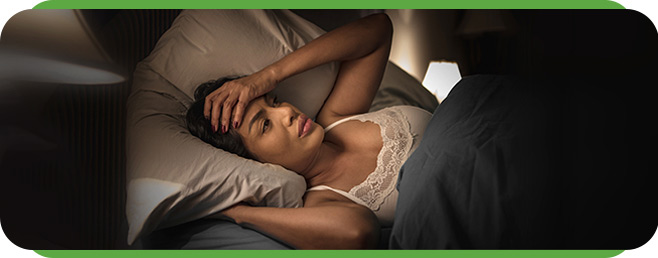Sleep & Mental Health
Find Out How Lack of Sleep Can Affect Your Mental Health & Well-Being.


Think about the last time you felt sleepy during the day. Did you find it harder to accomplish normal tasks? Did even ordinary problems overwhelm you more than usual? While it is common knowledge that lack of sleep can impact physical well-being, it also impacts mental health. In fact, a poor night’s sleep can leave you feeling negative, excessively worried or just plain stressed out. The National Sleep Foundation (NSF) notes that even very mild sleep deprivation over an extended time can impact mood, leaving you more irritable and even causing symptoms of clinical depression. A 2005 study in SLEEP found that people suffering from insomnia, a common sleep disorder, were nearly ten times as likely to have clinical depression and more than 17 times as likely to have clinical anxiety than those who sleep normally. The study concluded that the more frequently people wake at night as a result of insomnia, the higher the chances of developing depression.
The link between mental health and sleep is so strong that psychiatrists and other mental health professionals pay special attention to their patients’ sleep habits. According to the Anxiety and Depression Association of America (ADAA), nearly all psychiatric disorders involve some kind of sleep disruption. However, while these disorders may cause sleeping problems, Psychiatric Times notes that it is also possible for sleep disorders, specifically Obstructive Sleep Apnea (OSA), to “mimic or exacerbate” symptoms of depression, anxiety and panic disorder.
OSA, a sleep disorder that, according to the NSA, affects more than 18 million American adults, occurs when the muscles of the upper airway relax during sleep, the lower jaw falls back toward the throat and the airway becomes blocked. When this blockage occurs, blood oxygen levels plummet and blood pressure rises. The heart is forced to beat faster, causing the pulse rate to increase. The brain may cause the body to jerk in an attempt to wake the sleeper so breathing will resume. The silence may end with a loud snort, cough or gasp, causing the sleeper to wake briefly and begin breathing. This cycle can occur hundreds of times per night.
Because OSA severely disrupts sleep, it can also have a negative impact on one’s mental health. A study of nearly 19,000 people published in the Journal of Clinical Psychiatry, found that those with sleep apnea were over five times as likely to also have a major depressive disorder as people without apnea. The belief is that routine sleep disruptions can alter brain activity as well as neurochemicals impacting mood. OSA can also mimic panic attacks and increase levels of anxiety. An article for Sleep Review suggests that the frequent awakenings caused by OSA are often mistaken for panic attacks because people may awake feeling like they are struggling to breathe or perhaps even dying.
It is often difficult to gauge whether sleep problems are affecting mental health or vice versa. The relationship between the two is complex, but it is one that medical professionals should be aware of. While OSA is frequently associated with snoring and obesity, some people will present with more atypical symptoms such as unexplained anxiety or depression. If you are experiencing these or other symptoms of sleep apnea, consider asking your doctor to perform a sleep study. OSA is treatable, and doctors such as those at the Koala® Center For Sleep & TMJ Disorders have developed cutting edge, non-invasive treatment options to improve your sleep and your life.
Info. Box
Other Stress Relief Techniques:
- Get Moving Exercise is known to relieve stress and improve symptoms of anxiety and depression.
- Help Someone Else Try volunteering or participating in an event to help others. Doing so can take your focus off of your own worries or fears.
- Talk with Someone Find someone you trust to talk openly with about what you’re feeling. This could be a friend, family member, counselor or other medical professional.
- Breathing Techniques Practice simple breathing or meditation techniques when you’re feeling especially stressed or worried.

Additional Services You May Need
▸ KoalaKIDZzz®
▸ Sleep Apnea
▸ Snoring
▸ TMJ Disorder
▸ Fatigue
▸ Sleep Disorders
▸ Weight Loss
▸ CPAP Alternative
▸ Oral Appliances




